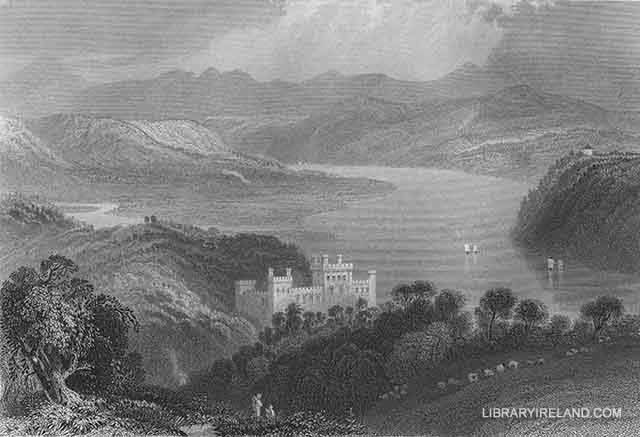The Blackwater River
The Blackwater, even in this country of lovely rivers, is eminently lovely. Its banks are bold, verdant, graceful, and gemmed with beautiful structures, offering, in its whole length, perhaps as great a variety of enjoyable scenery as any river in the world. In the view taken for this work of THE BLACKWATER BELOW DROMANA, one of the best of its thousand bright spots is presented to the reader. This spot, too, has an historic interest of a very high character. Dromana having been one of the residences of the powerful Lords of Desmond, in whose lives is embodied no small portion of the poetry of Irish history. "With possessions of nearly four counties," says Croker, "the Earls of Desmond, when actuated by private motives, were enabled to take the field with an armed force so considerable as to excite just apprehensions in those who had the government of an imperfectly subdued country."
The view of the small town of Lismore from the highly picturesque bridge which was built by the Duke of Devonshire, if not the most striking, is the most beautiful in this district of country. The Blackwater, both above and below the bridge which leads into the town, flows through one of the most verdant of valleys, just wide enough to show its greenness and fertility, and diversified by noble single trees and fine groups. The banks bounding this valley are in some places thickly covered, in other places thinly shaded with wood. Then there is the bridge itself, and the castle, grey and massive, with its ivy-grown towers; and the beautiful spire of the church, and the deep-wooded lateral dells that carry to the Blackwater its tributary streams. Nothing can surpass in richness and beauty the view from the bridge when, at evening, the deep woods, and the grey castle, and the still river are left in shade, while the sun streaming up the valley gilds all the softer slopes and swells that lie opposite.
There is, besides the cathedral, a large Roman Catholic chapel, a small Presbyterian meeting-house, a court-house, and good inn, a classical school, and schools for poor children, endowed and supported by the Duke of Devonshire. Lismore, in former ages, was a place of great learning and piety; it is now reduced to a small town, yet kept in good repair by the noble proprietor, whose large venerable castle, rising from the wooded rocks hanging over the river, forms the principal feature of the town.

